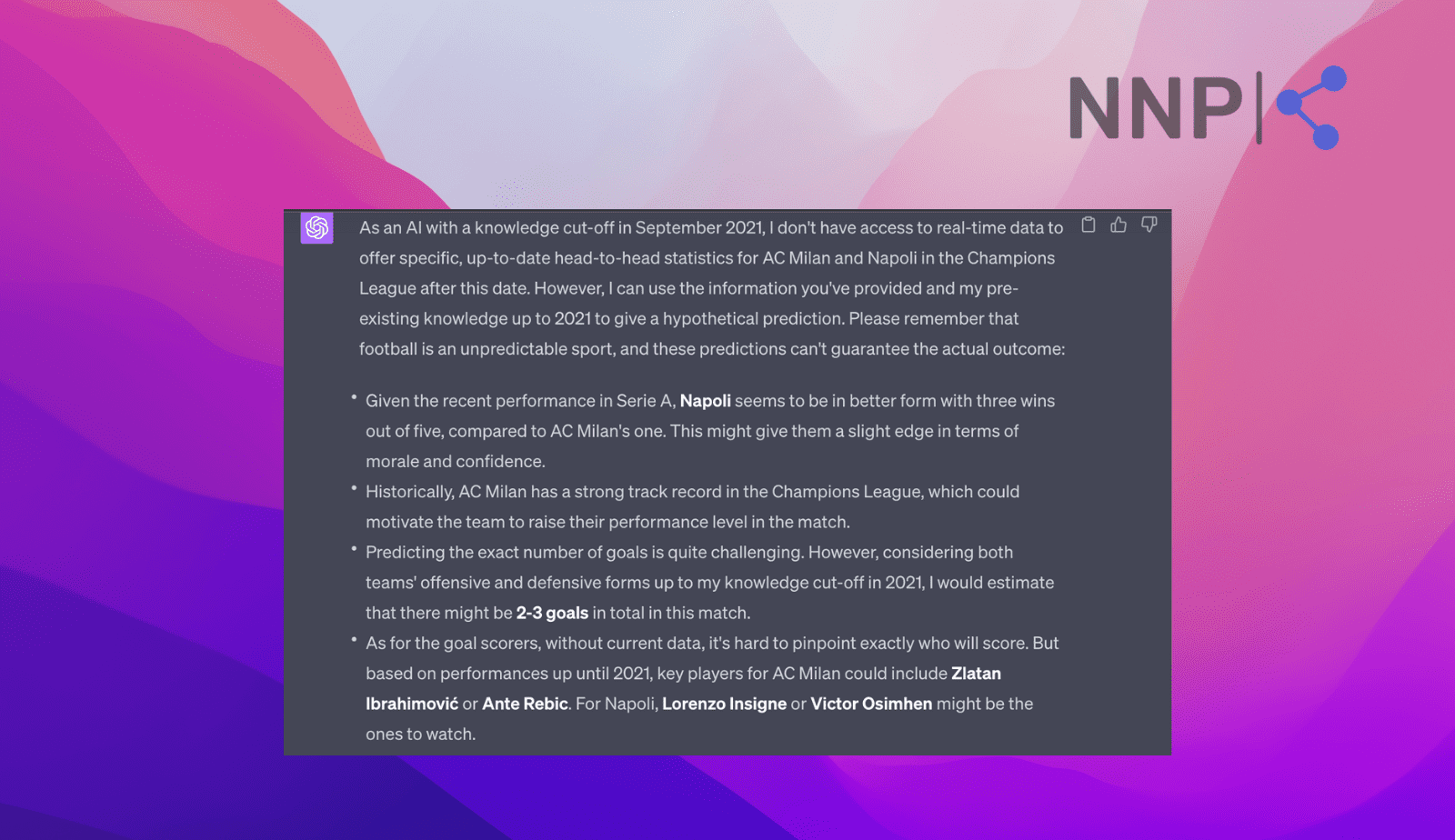ChatGPT Sports Betting: Win Your Bets With the ChatGPT Bot
Have you ever wondered if artificial intelligence could give you a leg-up in the high-stakes world of sports betting?
It wasn’t until recently that I realized sports bettors could use ChatGPT for their betting strategies. After a while of research, I realized that this popular chatbot could aid you in making more informed wagers by sifting through heaps of data and serving up tailored recommendations.
Some interesting results that you should check out.
This article is worth reading if you are ready to partner with AI and potentially transform your sports betting experience.
Let’s dive in!
Important Note: You cannot fully rely on ChatGPT to win the bets you place. When it comes to sports betting, the most you can get out of this chatbot is to use it as a research system before making your bet.
Bonus read: Leonardo AI - What is it and how to use it?
Pros of using ChatGPT for sports betting
- ChatGPT can analyze substantial volumes of sports data and statistics in real-time.
- It is capable of spotting trends and patterns possibly overlooked by humans.
- The AI provides timely updates on news, injury reports, and other game-altering factors.
- ChatGPT can also offer betting recommendations according to individual user strategies and preferences. A good example is when users are included in betting on underdogs, ChatGPT can identify games where underdogs have higher win probabilities.
- If a user's strategy leans towards betting on total scores, the AI can suggest games projected to have high or low cumulative scores.
- ChatGPT offers a degree of privacy not typically found with traditional betting avenues.
- This chatbot does not require submitting personal data or payment details, preserving users' anonymity.
Cons of using ChatGPT for sports betting
- ChatGPT's performance is directly tied to the quality and completeness of its data. Only reliable predictions can stem from accurate or complete data.
- ChatGPT’s recommendations are based on machine learning models and algorithms, which may not consider unquantifiable factors like team dynamics or player psychology.
- There might be times when ChatGPTs won’t be able to adapt to dynamic sports landscapes quickly.
- Changes such as a new player joining a team or a coach altering their strategy could render ChatGPT’s predictions outdated or inaccurate. For instance, if a team welcomes a new player or a coach shifts their game plan, the forecasts given by ChatGPT might be incorrect.
How to use ChatGPT in sports
Prompt:
“Act like a sports analyst. Collect head-to-head statistics between AC Milan and Napoli in the Champions league. Consider the fact that in AC Milan's last five matches in Italy's Serie A league, the team won once, lost twice, and tied twice. Similarly, consider how Napoli has won three times and lost twice in its last five matches. Based on that information, make a prediction in bullet points for who will win the match between AC Milan and Napoli on April 12, 2023, how many goals will be scored, and who will score them.”
How Siraj Raval created WagerGPT Utilizing ChatGPT
Siraj Raval is an artificial intelligence developer, a YouTuber who has used ChatGPT to develop a bot to help users make winning sports bets. In one of his interviews, he claimed that he is not a regular sports bettor, but he is more into the mathematical aspect of sports betting and how AI can help users predict their sports bets.
He did extensive research before making this bot, and this is how he explained how this process went along:
“The first three days I just kind of built the MVP myself, just taking together different code Snippets from GitHub, and then the next three days I kind of first recorded it, and then I edited it, and then I released it, and then there was a whole marketing push… I think it’s a lot easier now than before because you don’t have to code any of the starting templates; that template already exists, and it’s on my GitHub.”
Further, he proceeded to explain how ChatGPT helped him to get along with it;
“I went through all those, went to the Pinnacle API, Geo blocked, and then to Bet365. I almost got disillusioned, but I was like, how about decentralized sports betting?
Then he was asked at what level of coding education expertise and talent one needs to be able to pull this off:
His response:
“Well, hopefully, zero, now that the video is out there because my code is now available. The only coding expertise is hitting run on that notebook which runs in your web browser, whether Chrome or whatever. Just like you would go to a website, you open up that code; it’s called a Google Collab and has a bunch of code in there, but all you have to do is hit play, and it will run the model on Google’s server. It’s a neural network that uses all the data it’s been trained on today, using FanDuel, the Odds, or whatever API. It will output the expected value for each team, specifically for the NBA, for which I tailored it.”
Here is the whole video where he explains it all.
https://www.youtube.com/watch?v=8EFJagJkQLI
Here is a link to the sports betting bot code: https://www.youtube.com/watch?v=IDthta5sUGQ
Another bonus read: From Letters to Lights, Camera, Action: Text-to-Video AI Generation
Wrapping up
Now you understand that deploying ChatGPT as a tool for sports betting can only enrich your toolkit.
The ability of the chatbot to sift through data and deliver bespoke suggestions can aid users in making educated choices, thereby increasing their likelihood of success.
It's crucial to remember that the chatbot's forecasts might not always hit the mark, and users should undertake independent investigations before placing any wagers.
Users can devise a successful betting plan by amalgamating the chatbot's data with their expertise and intuition.
FAQs
-
Can ChatGPT be used for sports betting?
-
ChatGPT can provide relevant responses concerning your sports bets queries. However, you should only trust it partially but use it as a research tool as it is trained on actual data.


